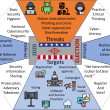Prioritizing rapid restore leads to stronger ransomware attack recovery
Citizens across the country are feeling the effects that a ransomware attack can have on society. Between the Colonial Pipeline attack that caused gas shortages on the East Coast, the D.C. Metro Police Department attack that released personal information of employees, and the Oldsmar Water Hack that could have devastated Florida drinking water, many now have cause to question the strength of our cybersecurity infrastructure at all levels of government.
Government agencies of all sizes and functions are left wondering if and when they could be hit, highlighting the growing necessity of state and local data protection.
Combating cost concerns
In the case of the Colonial Pipeline attack, the effects of the gas shortage rippled down the East Coast in spite of the ransom—$5 million—being paid in full. The D.C. Metro Police Department did not pay the $4 million fee demanded by hackers to restore information, resulting in the release of employee information. In both cases, the ransomware victim paid a high price operationally and financially due to their organization’s vulnerability.
These numbers are daunting for agencies of all sizes. Paying the ransom in the event of an attack is not a guarantee that the effects of the attack can be mitigated. Nevertheless, with the right data security processes in place, the likelihood of enduring these costs in the first place can be reduced significantly.
Cyberattacks have become almost inevitable in a world constantly on the cusp of IT modernization. IT leaders must continue to evaluate their backup processes to ensure that they remain protected against these imminent threats. Without the right solutions, state and local agencies face potentially crippling data vulnerabilities.
More vulnerable than ever
Cities and states possess large amounts of valuable personal data, making them an ideal target for ransomware attacks. Citizens expect a high level of protection of their personal information and trust state and local government to provide that security.
To combat these vulnerabilities, state and local governments must have a clear disaster recovery plan regarding storage and backup capabilities. Cyberattacks can take down entire systems, and networks with greater amounts of data are largely more vulnerable. Having the ability to isolate the impacted traffic in the network in case of a cyberattack is a vital assurance for governments seeking to preserve their data security.
Embracing modern data solutions
The premier solutions for governments facing these threats are those that focus on preventing and minimizing risk in the event of an attack. Having the fastest possible recovery time helps state and local governments avoid significant organizational and financial impacts. Effective backup and rapid restore against ransomware attackers will help protect the valuable data in any agency.
To ensure the most efficient backup and recovery means, state and local governments should look for solutions that implement a modern data experience. Modern data protection is fast, simple and cost-effective. This strategy helps prevent the devastating effects of cyberattacks that could reduce productivity, cost millions, threaten mission-critical work or create a lapse in essential citizen services.
State and local governments across the country are looking to reframe their services through the delivery of digital government. By leveraging solutions designed to enable a modern data experience, state and local governments can elevate their citizen service capabilities while also running on a simple, seamless and sustainable platform.
Prevention is key
State and local governments are working with more citizens and information than ever before. Their citizens trust and rely on their services, their support and their security. To maintain this trust, governments need to have the proper digital infrastructure to support and continue operations in the event of an attack. Accelerating digital transformation will help them grow their capabilities and provide services to citizens more efficiently—while also preparing them for the worst.
The Colonial Pipeline and the D.C. Metro Police attacks have highlighted how easily accessible our data can be for attackers. More poignantly, they have demonstrated just how present the threat of a ransomware attack is today. State and local IT leaders must take steps to invest in solutions that prioritize backup and recovery—because the best way to stay ahead of a breach is to assume it has already happened. Mitigate risk and bolster data security by prioritizing rapid restore.
Michael Wiseman is the vice president, public sector, Pure Storage, leading the sales team responsible for federal, state, local and education customers. In his current role, Wiseman is responsible for developing a team to enable the transformation of how public sector customers protect, serve and educate their constituents by leveraging technology to connect, innovate and lead. Prior to joining Pure Storage, Wiseman spent 17 years at Cisco.



















